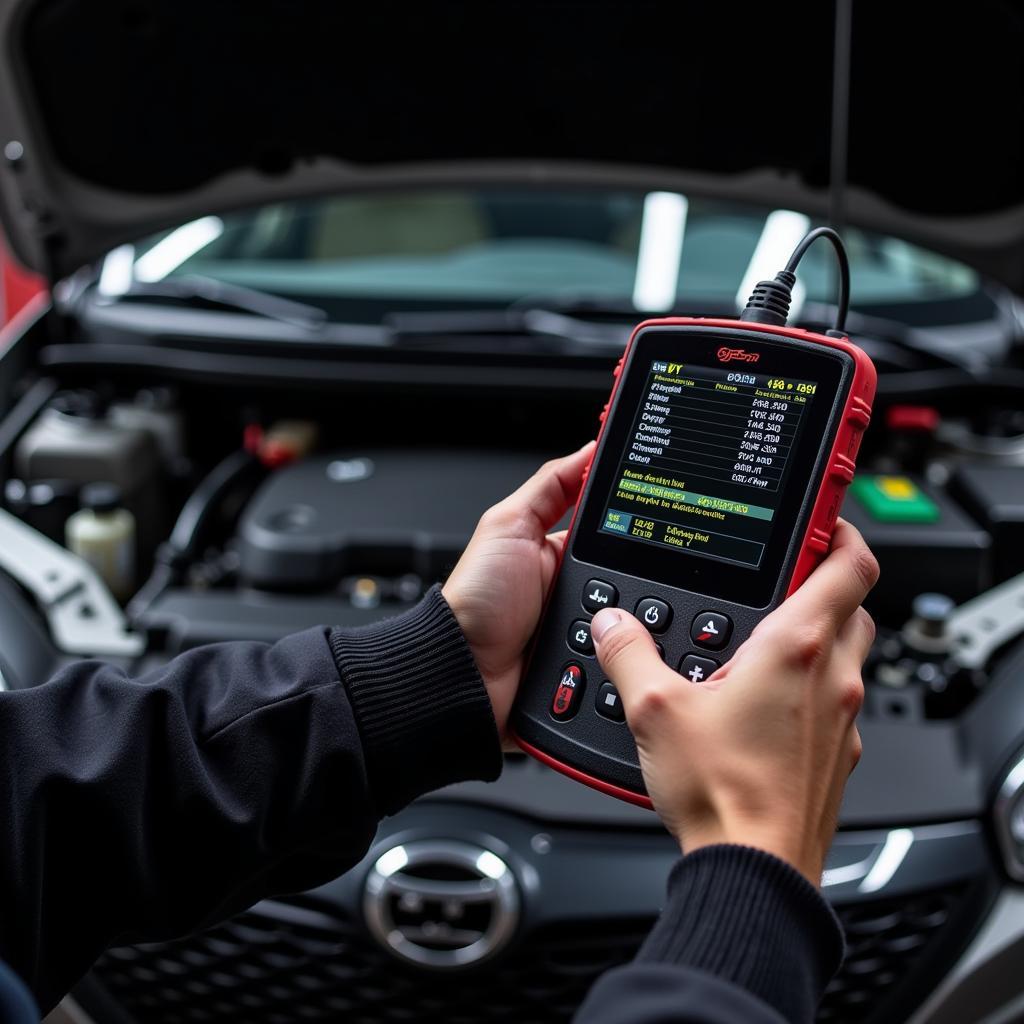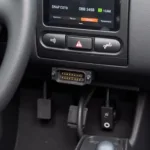OBD2 performance chips are often touted as an easy and affordable way to boost your car’s horsepower and fuel efficiency. But do these little devices actually live up to the hype, or are they too good to be true? This article dives deep into the world of OBD2 performance chips, examining their functionality, potential benefits, and common misconceptions.
Understanding OBD2 Performance Chips: What They Are and How They (Supposedly) Work
Before we can determine if OBD2 performance chips deliver on their promises, it’s crucial to understand what they are and how they claim to improve vehicle performance. Essentially, an OBD2 performance chip is a small electronic device that plugs into your car’s OBD2 port, typically located under the dashboard on the driver’s side.
These chips are marketed as being able to modify the data your car’s Engine Control Unit (ECU) receives from various sensors, ultimately altering parameters like fuel-to-air ratio, ignition timing, and boost pressure. By making these adjustments, OBD2 performance chips supposedly optimize your engine’s performance, leading to increased horsepower, torque, and fuel economy.
The Appeal of OBD2 Performance Chips: Why They’re Tempting
The allure of OBD2 performance chips is understandable. They offer a seemingly simple and cost-effective alternative to more expensive and complex performance upgrades, like engine tuning or aftermarket exhaust systems. Who wouldn’t want a quick and easy fix to unlock hidden horsepower and improve fuel economy? This is precisely the marketing strategy employed by many manufacturers of these chips, preying on the desire for affordable performance enhancement.
Debunking the Myths: The Truth About OBD2 Performance Chips
While the concept of an OBD2 performance chip sounds appealing, the reality is far less impressive. In most cases, these chips simply cannot deliver on their grandiose promises. Here’s why:
- Limited ECU Influence: OBD2 performance chips primarily function by manipulating sensor readings. However, modern ECUs are sophisticated systems that rely on complex algorithms and adaptive learning to optimize engine performance. Simply altering a few sensor inputs is unlikely to fool the ECU into making significant and lasting performance adjustments.
- Generic Tuning: Many OBD2 performance chips are marketed as “one-size-fits-all” solutions for a wide range of car models and engine types. However, each vehicle has unique engine parameters and performance characteristics. Applying generic tuning modifications rarely results in optimal performance and can potentially harm your engine in the long run.
- Placebo Effect: Some users who report performance gains after installing an OBD2 performance chip may be experiencing a placebo effect. The subjective feeling of increased power could be attributed to altered throttle response or simply the belief that the chip is working.
 OBD2 Scanner Displaying Engine Data
OBD2 Scanner Displaying Engine Data
When OBD2 Chips Might (Slightly) Help
While OBD2 performance chips are unlikely to transform your car into a speed demon, there are limited scenarios where they might offer minor benefits:
- Older Vehicles: Cars manufactured before the widespread adoption of advanced ECUs might be more susceptible to modifications made by OBD2 performance chips. However, even in these cases, the performance gains are likely to be minimal.
- Specific Applications: Certain reputable manufacturers produce OBD2 chips designed for specific vehicle models and engine types. These chips may offer slightly more tailored tuning adjustments, potentially resulting in minor performance improvements.
“It’s crucial to remember that the OBD2 port was primarily designed for diagnostics and emissions monitoring, not performance tuning,” says automotive engineer, David Thompson. “While some chips might claim to optimize certain parameters, expecting substantial horsepower gains from a simple plug-and-play device is unrealistic.”
The Importance of Proper Tuning
If you’re serious about enhancing your car’s performance, it’s essential to consult with a qualified mechanic or tuning specialist. Professional engine tuning involves a comprehensive analysis of your vehicle’s specific characteristics and requires specialized equipment and expertise.
A proper tune will involve adjusting various engine parameters, including fuel maps, ignition timing, and boost pressure, to work harmoniously within your engine’s operating range. This personalized approach ensures optimal performance gains while safeguarding your engine’s health.
Making Informed Decisions
While the idea of a cheap and easy performance upgrade is tempting, it’s important to approach OBD2 performance chips with a healthy dose of skepticism. Before investing in such a device, thoroughly research the manufacturer, read independent reviews, and consider the potential risks involved.
FAQ: OBD2 Performance Chips
Q: Can OBD2 performance chips damage my engine?
A: While unlikely to cause immediate catastrophic damage, using a generic or poorly designed chip could lead to long-term engine wear and tear due to improper tuning.
Q: Are there any reputable OBD2 performance chip manufacturers?
A: A few reputable manufacturers produce specialized chips for specific vehicle models. However, it’s crucial to research and choose carefully.
Q: What’s the best way to improve my car’s performance?
A: Consulting with a qualified mechanic or tuning specialist for professional engine tuning is the safest and most effective way to enhance your vehicle’s performance.
Need Help Choosing the Right OBD2 Scanner for Your Needs?
Choosing the right OBD2 scanner can be challenging, especially with so many options available. If you need help selecting a scanner or have any questions about OBD2 diagnostics, don’t hesitate to contact our team of experts via WhatsApp at +1(641)206-8880 or email us at cardiagtechworkshop@gmail.com. Our 24/7 customer support is always here to assist you. You can also find more information about OBD2 scanners and their functionalities on our website, such as our detailed reviews of the Land Rover U480 OBD2 Car Diagnostic Scanner and the EAS Landrovee Bluetooth OBD2.
If you’re a Land Rover owner, you might be interested in our article discussing Land Rover OBD2 programming or our guide to finding the best OBD2 scanner for Range Rover. We also have a helpful article explaining the OBD2 code P0171, which is a common engine code related to fuel system issues.
Remember, understanding your vehicle’s data is the first step towards better maintenance and performance.

